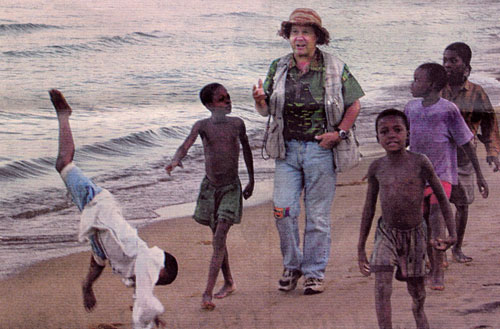Class News
Commodities Bull Jim Rogers '64
A Commodities Bull Can Find No Reason To Pull In His Horns
James Rogers Sees Recent Declines As Little More Than Temporary Setbacks
New York Times, June 2, 2006
By MICHAEL J. DE LA MERCED (more about Rogers,
and more,
and more)
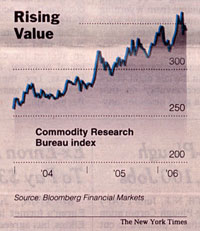
James B. Rogers Jr. calls himself the world's worst market timer. It is
an air of modesty he cultivates with sometimes folksy anecdotes and an
ever-present drawl.
But market timing aside, as an avowed commodities bull, Mr. Rogers is
undeterred even as less committed bulls suspect that the peak is past.
A fund manager, author, traveler and occasional television commentator, Mr.
Rogers says he believes that the commodities market is less than a decade
through a bull market that could last more than 20 years.
"Someday there will be 10,000 mutual funds that trade commodities," he said.
"On Park Avenue, wives won't talk about flipping real estate. They'll be
talking about soybeans and pork belly futures."
Of those critics who say commodities are only this year's dot-corns, he
says, "Two or three years ago, they couldn't even spell commodities."
By contrast, Mr. Rogers says he has been trading commodities since the early
1970's, even before the commodities boom of that decade.
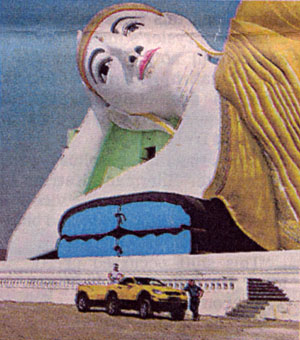
Jim and Paige with their Millenium Mercedes
in front of a reclining Buddha in Myanmar
He also has a string of unique experiences in the markets. Mr. Rogers
co-founded the Quantum Fund with George Soros in 1969, and retired in 1980
at the age of 37. After a stint at the Columbia Graduate School of Business,
Mr. Rogers embarked on two global adventures, one by motorcycle, detailed in
"Investment Biker," a book he published in 1995, and one in a custom "Millennium
Mercedes" the size and color of Big Bird, the Sesame Street character.
His adventures earned him the sobriquet "the Indiana Jones of finance" from
Time magazine.
More important, he said, those adventures have given him some insight into
the state of various markets around the world, from sweet-toothed
Armani-clad youth in China to corruption-laden bureaucracies in Nigeria.
His faith in a commodities bull run seems ill-timed given the sharp declines
metals have taken after recent spikes. The price of a gold futures contract
for delivery In June, for instance, closed yesterday at $629.60 an ounce on
the Commodity Exchange in New York, down from $728.60 last month.
"We'll always have big consolidations," Mr. Rogers conceded.
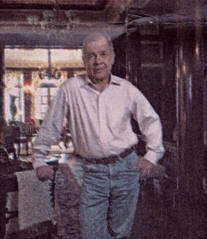
Jim in his office in New York
But as crude oil stays stubbornly above $70 a barrel, it's hard to dismiss
him outright.
Though he concedes that energy and metals have hit a rough patch, with zinc
and copper due for a correction, Mr. Rogers Insists that commodities as a
whole will continue to go up.
Look Instead at agricultural products, especially sugar and coffee, he said,
which currently trade far below their historical highs.
Coffee, which traded for more than $3.37 cents at one point in 1977, was
trading at about $1 a pound this week. Sugar, which traded as high as 66
cents a pound in 1974, was trading for about 15 cents a pound this week.
Of course, Mr. Rogers has a stake in promoting that idea. He is the author
of Hot Commodities, a book about commodities investing he wrote in
2004.
And he is the creator of the Diapason Rogers Commodities Index Fund, an
investment fund that buys commodities and is based on the Rogers
International Commodities Index of 35 futures contracts, which Mr. Rogers
also developed. From Jan. 1 through May 31, his commodities index fund rose
9.4 percent. The Standard & Poor's 500-stock index is up 1.7 percent over
the same period.
He points to academic studies that show bull markets lasting anywhere from
15 to 23 years; given those figures, the commodities bull run that started
in 1999 should last until 2022. And more important, he says, commodities
producers have failed to develop new sources of production.
Demand for lead has exploded, but the last new smelter built in the United
States was opened in 1969. 0il companies have not opened significant new oil
fields in more than 25 years. The story is the same with copper.
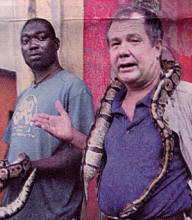
With a python
"I was with a couple of copper mining CEOs recently, and they said they were
having a hard time finding labor, saying, ‘We can't find engineers, we can't
even find miners,'" Mr. Rogers said. "And I asked them if they even know the
level of their reserves. And no one knew."
Couple that with voracious appetites for commodities in China and India, and
the prices should continue to climb, he said.
"The last time we had a bull market, three billion people in Asia were
closed off," Mr. Rogers said. "Now we have China, we have India looking for
commodities. They've all seen Western TV."
Mr. Rogers has great faith in China as the bull to which the commodities
market is yoked. He says he believes that China will fully float its
currency, the yuan, in time for the 2008 Summer Olympics in Beijing, and
that China's growing capitalist class will displace the Communist Party.
Mr. Rogers is bearish on the United States. To him, America's time has
passed, with its $8.36 trillion in debt, a weak dollar and its dependence on
imported oil. He recommends selling United States dollars.
He recommends investing in countries with well-managed commodities
production, like Canada, Brazil and Argentina, as well as China.
Mr. Rogers believes in China so much that he hired a nanny who speaks only
Mandarin to his 3-year-old daughter. Signs taped around the Rogers household
name objects in English and in Mandarin: a panda statue bears one with the
characters for "xiong mao." Hanging above the stainless steel stove is the
word "zhao."
His wife, Paige Parker, who was his traveling partner in the Mercedes during
the "Adventure Capitalist" journey, is learning Mandarin this summer. Mr.
Rogers said he might try to pick it up, but he has few illusions about his
chances for success. "I'm tone deaf," he said.
